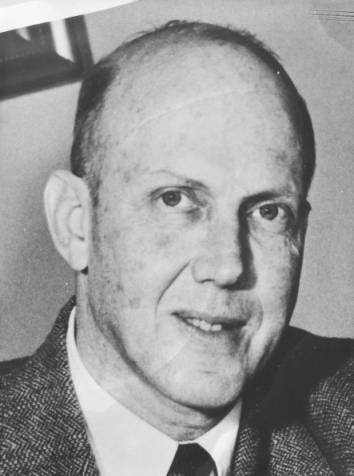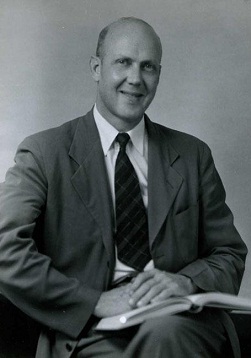Crittenden, Charles Christopher
1 Dec. 1902–13 Oct. 1969
See also: Crittenden Award.
 Charles Christopher Crittenden, university professor, historian, author, and state agency head, was born in Wake Forest, the only child of Charles Christopher and Ethel Taylor Crittenden. His father was a teacher of pedagogy, and his mother was for many years librarian of Wake Forest College. His maternal grandfather, Charles E. Taylor, was president of the college from 1885 to 1905. Charles Christopher Crittenden, Sr., died when his son was less than a year old, and so the younger Crittenden never adopted the suffix "Jr." After about 1940 he ceased using his first name.
Charles Christopher Crittenden, university professor, historian, author, and state agency head, was born in Wake Forest, the only child of Charles Christopher and Ethel Taylor Crittenden. His father was a teacher of pedagogy, and his mother was for many years librarian of Wake Forest College. His maternal grandfather, Charles E. Taylor, was president of the college from 1885 to 1905. Charles Christopher Crittenden, Sr., died when his son was less than a year old, and so the younger Crittenden never adopted the suffix "Jr." After about 1940 he ceased using his first name.
Crittenden attended the local public schools and received from Wake Forest College the B.A. degree in history in 1921 and the M.A. degree in 1922. During the school year 1922–23 he was principal of Roxobel School in Bertie County, after which he entered graduate school at Yale University. He was instructor of history at Yale in 1924–25 and received his Ph.D. degree from Yale in 1930. He was instructor of history from 1926 to 1929 and assistant professor of history from 1930 to 1935 at The University of North Carolina. In 1935 he was elected to succeed Albert Ray Newsome as secretary of the North Carolina Historical Commission in Raleigh. Except for a year's leave of absence (1946–47), when he was in Washington, D.C., as assistant director of the World War II Records Project of the National Archives, Crittenden remained executive head of the historical commission (renamed the North Carolina Department of Archives and History in 1943) until 1968; he then stepped down to the assistant directorship, which position he held until his death. In 1936–37 he also served as state director of the Historical Records Survey and regional director of the Survey of Federal Archives.
During his thirty-three years as head of the state's historical agency, Crittenden transformed a respectable department into a model for other states. While demanding adherence to scholarly principles, he adopted the slogan "History for all the people" and put greater emphasis on historical markers and easy-to-read materials for use in the public schools. He expanded the archival program to encompass modern records management, promoted the publication of primary source materials, assumed administration of state historic sites, and encouraged the preservation of historic properties by nonstate groups. The agency staff grew from 8 people in 1935 to 135 in 1968. Crittenden also guided various history-related agencies and organizations, such as the Carolina Charter Tercentenary Commission, Confederate Centennial Commission, and North Carolina Society for the Preservation of Antiquities. At the height of his successful career in "selling" the history of North Carolina, he supervised the movement of the agency into the new Archives and History-State Library Building in 1968 and then stepped down as director.
 Crittenden's innovative leadership of the state historical agency was matched by his varied national activities. He was a founding member and later president (1946–48) of the Society of American Archivists, chairman (1938–40) of the Conference of Historical Societies, and a founder and first president (1940–42) of its successor organization, the American Association for State and Local History. In 1946 he was one of three persons who met with David E. Finley and proposed the formation of an organization patterned after the National Trust of England. This proposal led to the organization of the National Council for Historic Sites and Buildings, which in turn led in 1949 to the creation of the National Trust for Historic Preservation, of which Crittenden served as a trustee.
Crittenden's innovative leadership of the state historical agency was matched by his varied national activities. He was a founding member and later president (1946–48) of the Society of American Archivists, chairman (1938–40) of the Conference of Historical Societies, and a founder and first president (1940–42) of its successor organization, the American Association for State and Local History. In 1946 he was one of three persons who met with David E. Finley and proposed the formation of an organization patterned after the National Trust of England. This proposal led to the organization of the National Council for Historic Sites and Buildings, which in turn led in 1949 to the creation of the National Trust for Historic Preservation, of which Crittenden served as a trustee.
From 1935 until his death, Crittenden was secretary-treasurer of the North Carolina Literary and Historical Association, in which capacity he was in charge of the state's annual "Culture Week," a unique gathering of cultural organizations with a state-wide mission. He also held offices in other professional organizations, including the presidency of the Archaeological Society of North Carolina (1948–50, 1955–56) and of the Historical Society of North Carolina (1956–57).
Crittenden was a prolific writer. From 1935 until his retirement he was editor of the North Carolina Historical Review. His first book, North Carolina Newspapers before 1790, was published in 1928, and The Commerce of North Carolina, 1763–1789, appeared in 1936. With Dan Lacy he compiled and edited The Historical Records of North Carolina: The County Records (3 vols.) in 1938–39. In 1944 he compiled and edited Historical Societies in the United States and Canada: A Handbook. For a time he was a member of the advisory editorial board of American Heritage. His articles and reviews were published in many scholarly journals, and for several years prior to his death he wrote a weekly column for the Associated Press, titled "The Light of History."
Two honorary degrees were conferred upon Crittenden, the Litt.D. from Wake Forest College in 1956 and the LL.D. from The University of North Carolina in 1961. In 1963 he received the Award of Distinction, the highest honor bestowed upon an individual by the American Association for State and Local History. He was a fellow of the Society of American Archivists, and in 1964 his department received the first Distinguished Service Award ever conferred by that society.
Crittenden was a Democrat and a Baptist, though he wore his religion lightly. A jovial man, he became something of a legend even during his lifetime because of his wisecracks, practical jokes, and attractions to the unusual.
Crittenden married Janet Quinlan of Waynesville on 6 Sept. 1930, and they had three children: Charles Christopher, Jr. (b. 11 Nov. 1933), Robert Hinton (b. 11 Mar. 1936), and Ann Lane (b. 23 June 1938).
Crittenden died after suffering a stroke and heart attack, and his body was cremated.
To commemorate Crittenden's service, the North Carolina Literary and Historical Association established the Christopher Crittenden Memorial Award, given annually to an individual, group, or organization for extraordinary contributions to the preservation of North Carolina history.
References:
Biennial reports of the North Carolina Historical Commission (1934–42) and State Department of Archives and History (1942–68).
Philip C. Brooks, "Christopher Crittenden," American Archivist 33 (1970).
North Carolina State Archives (Raleigh), for Crittenden's personal papers, official records of his administration of the department, and photographs.
William S. Powell, ed., North Carolina Lives (1962).
Raleigh News and Observer, 15 Oct. 1969.
Washington (N.C.) Daily News, 29 Oct. 1969.
Who's Who in America, 1952–69.
Who's Who in North Carolina, 1947.
Additional Resources:
"C. C. Crittenden 1902-1969." N.C. Highway Historical Marker H-105, N.C. Office of Archives & History. https://www.ncdcr.gov/about/history/division-historical-resources/nc-highway-historical-marker-program/Markers.aspx?sp=Markers&k=Markers&sv=H-105 (accessed October 21, 2013)
Hill, Michael. "Christopher Crittenden: Populist Historian at the Helm." North Carolina Office of Archives & History. 2004. http://www.history.ncdcr.gov/centennial/features/crittenden.htm (accessed October 21, 2013)
Crittenden, Christopher. "We've Come a Long Way: History and Historical Activities in North Carolina." North Carolina Histroical Review 36, no. 2 (April 1959). 153-161. https://archive.org/stream/northcarolinahis1959nort#page/152/mode/2up (accessed October 21, 2013).
Tyrrell, Ian. Historians in Public: The Practice of American History, 1890-1970. University of Chicago Press, 2005.222-228. http://books.google.com/books?id=M1uqjZk2n1MC&pg=PA222#v=onepage&q&f=false (accessed October 21, 2013).
Image Credits:
Charles Christopher Crittenden. Image courtesy of the Digital North Carolina Collection Photographic Archives. Available from http://dc.lib.unc.edu/cdm/singleitem/collection/dig_nccpa/id/1223/rec/37 (accessed June 11, 2013).
North Carolina State Dept. Of Archives and History. "Photograph Accession #: H.1953.54.1." 1952. From the North Carolina Museum of History.
1 January 1979 | Jones, H. G.